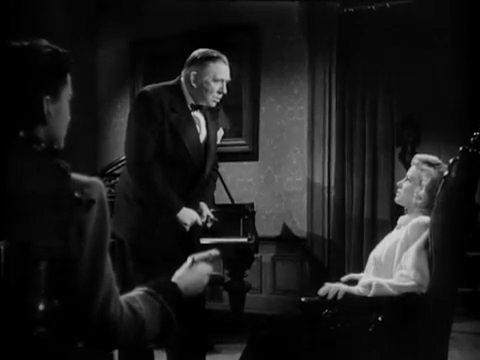Crack-Up

The art critic who can’t see Dali for beans, “next week we’ll go into
the subject of Modern Art more deeply.”
A mysterious train ride that is a curious fount of
inspiration to The Twilight Zone (Matheson’s “Nightmare at 20,000 Feet”, dir. Richard
Donner, Serling’s “A Stop at Willoughby”, dir. Robert Parrish).
A collector who is the original of Frankenheimer’s colonel (The Train). “Perhaps you can’t understand how much these paintings mean to me. Did you ever want to possess something desperately, that was unobtainable, that you couldn’t buy? Museums have a habit of wasting great art on dolts, who can’t differentiate between trash—and these masterpieces that mean everything in life to me.” An evocation of Dali’s style at last, noted by Resnais in Vous N’Avez Encore Rien Vu, a certain echo of Hitchcock’s Spellbound.
The transition is
one of the most interesting passages in film since Capra’s Arsenic and Old Lace (cf.
Dmytryk’s Mirage, Mann’s Mister Buddwing,
North by Northwest is related).
Shadow of a doubt for the two Kafka persuaders on the train, Zeffirelli’s Tea with Mussolini for the position.
From Millet’s Angelus to Vermeer’s Woman with a Pearl Necklace, by way of
Gainsborough and Dürer and a little man with a mustache, several.
“No doubt about
it, those boys could paint.”
Bosley Crowther
of the New York Times, “must have baffled the script
writers, too, for they never do give it a logical explanation.” Leonard Maltin, “tense,
fast-paced Hitchcockian thriller”. TV
Guide, “solidly in the realm of classic film
noir.” Jonathan Rosenbaum (Chicago
Reader), “generally considered well above average.” Tom Milne (Time Out), “a
modest but gripping little thriller... marginally intriguing”. Catholic News Service
Media Review Office, “puzzling proceedings”. Halliwell’s Film Guide, “a thriller with a difference.”
The wartime manufacturer who sold
defective cylinders for airplane engines to the Army.
Later on this is explained in
Robert Wise’ Executive Suite, and explained away in Satyajit Ray’s Company
Limited.
The play passes from Arthur
Miller to Chester Erskine and Reis, who remembers Sam
Wood’s Our Town on the set,
a comprehensively realistic setting.
Bosley Crowther (New York
Times) thought the system was to
blame. Variety
acknowledged “dramatic dynamite.” According to Halliwell, “well-meaning but
artificial and unconvincing.”